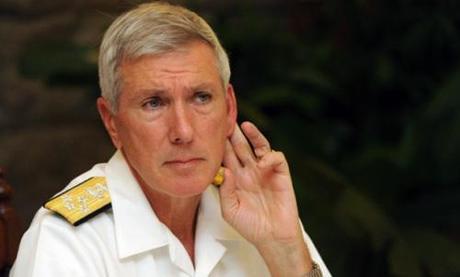Israel’s Defense Minister Moshe Yaalon taunts the Obama administration, saying the only way Israel could be “saved” is if Secretary of State John Kerry would just “leave us alone.”
Britain’s senior military advisor Sir Hew Strachan dismisses Obama as a know-nothing (“Obama has no sense of what he wants to do in the world”) who has “undermined America’s military reputation and destabilized the Middle East.” (See my post of yesterday, “Foreign leaders openly scorn US President Obama.“)
Now none other than the chief of the U. S. Pacific Command is confirming the decline of U.S. power in the Asia-Pacific region, a superiority that increasingly is eclipsed by a rising China.

Guy Taylor and Rowan Scarborough report for the Washington Times that three years after the Obama administration’s ballyhooed military “pivot” to Asia (and concomitant de-emphasis on Europe), the top U.S. commander in the Pacific, Navy Admiral Samuel J. Locklear III, says that U.S. dominance in Asia has weakened in the shadow of a more aggressive China.
At the annual Surface Navy Association conference in Virginia on Jan. 15, 2014, Adm. Locklear said, “Our historic dominance that most of us in this room have enjoyed is diminishing, no question.”
While it is obvious that Chinese military power is growing, Locklear maintains it is unclear whether China will seek to be a hard adversary to the U.S. in the long term. He recommends Washington should be working overtime on steering Beijing toward a cooperative security posture. “China is going to rise, we all know that. [But] how are they behaving? That is really the question,” the admiral said, adding that the Pacific Command’s goal is for China “to be a net provider of security, not a net user of security.”
His remarks offered insight into the introspection at the Pentagon’s highest levels about how the U.S. should tailor its military presence in the region, where Beijing and Moscow — regional powerhouses and former Cold War adversaries to Washington — are keen to challenge U.S. dominance.
That Locklear thinks the U.S. could mold Beijing to be a “cooperative” partner stuns Heritage Foundation analyst Dean Cheng. Cheng observes, “The problem with this formulation is, for whom does Adm. Locklear think China will be providing security? The implicit answer is ‘to everyone,’ because the assumption is that we can somehow mold China into being ourselves — that China will see its interests as somehow congruent and coincident with those of the United States, and therefore China will assume the mantle of regional provider of public goods. But this is a remarkable assumption, especially in light of recent Chinese behavior. China is not interested in providing security for everyone and, frankly, not even for anyone other than itself. This is the kind of bizarre lens that led one of Adm. Locklear’s predecessors to offer to help China with its carrier development.”
Meanwhile the Chinese are crowing.
Global Times, China’s official English-language newspaper, trumpeted Adm. Locklear’s remarks in a story beneath the headline “U.S. losing grip on Pacific: PACOM.”
In the Global Times story, Jin Canrong, a deputy dean of the School of International Studies at Renmin University of China, said Adm. Locklear’s comments are a recognition of China as a rising military power, but that “some people, who sit in their offices in Washington, tend to hold a more hard-line position toward China.”
China has focused its attention and actions almost exclusively on its naval and air power over waterways in its immediate vicinity.
Much of Beijing’s posturing has been within the context of territorial disputes with longtime U.S. ally Japan and smaller Pacific nations over patches of islands in the South and East China seas.
Read the rest of the Washington Times article here.
An Obama appointee, Locklear became Commander of the United States Pacific Command (USPACOM) on 9 March 2012. Based in Honolulu, USPACOM is the oldest and largest of the armed forces’ Unified Combatant Commands.
For the record, this is the same Admiral Samuel Locklear III who, in an interview with the Boston Globe in March 2013 and despite the fact that global surface temperatures have not followed the expected global warming pattern (a “hiatus” in rising temperatures) for the past 20 years, said that the greatest threat to the Pacific region is not China or North Korea, but “climate change.”

